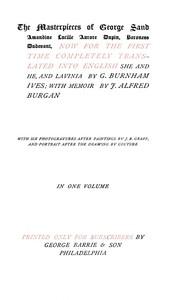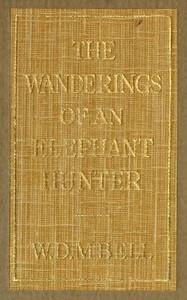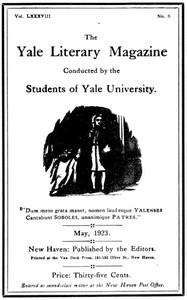|
|
Read this ebook for free! No credit card needed, absolutely nothing to pay.Words: 99413 in 31 pages
This is an ebook sharing website. You can read the uploaded ebooks for free here. No credit cards needed, nothing to pay. If you want to own a digital copy of the ebook, or want to read offline with your favorite ebook-reader, then you can choose to buy and download the ebook.

: She and he; Lavinia; Memoir by Sand George Burgan J Alfred Contributor Graff J B James Bell Illustrator Ives George Burnham Translator - Sand George 1804-1876; French fiction 19th century@FreeBooksThu 08 Jun, 2023 t on corn-sheaves, that fill the yard. We read and work much, hardly ever thinking of going out. We enjoy a plenty of music." According to her own account, Madame Dudevant had become a settled countrywoman. In 1829, Monsieur and Madame Dudevant passed two months in Bordeaux and at the home of her husband's mother; and on her return to Nohant in July she resumed her quiet home life, restricting the circle of her friends in conformity with her retired tastes. Here they enjoyed the society of her half-brother and his wife. But the period of outward calm and resignation to her condition was fast nearing its term. The relations between the husband and the wife were rapidly growing worse. Among the wife's occupations and diversions of this period were painting and composition. Of the former, Madame Dudevant speaks with enthusiasm later; already, in 1827, she had tried her hand at portrait-painting, for in a letter to her mother she writes: "I send you a profile drawing done from imagination; it is a regular daub. It is well that I should tell you that it is intended as a representation of Caroline. I am the only one who sees a likeness in it.... I also drew my own portrait.... Yet I did not succeed better than with Caroline's.... I laugh in its face on recognizing how pitiable it makes me look, so I dare not send it." And again, early in February, 1830, she sends a portrait of her son to her mother. It is well, as we shall soon see, that Madame Dudevant was so little encouraged by her efforts. Yet of her literary proclivities, which she also indulged by attempts at novel-writing, she was certainly not convinced, and of her ability in this direction still less so. The education of her son Maurice had now become a matter of extreme importance to Madame Dudevant. The boy was six years old, and she was fortunate enough to secure as his tutor Monsieur Jules Boucoiran, of Paris, who later became her trusted friend and the wise counsellor of her son. How carefully Madame Dudevant still concealed her marital wretchedness from even her mother is evidenced in a letter written in December, 1829, in which she says: "What are you doing with my husband? Does he take you to the theatre? Is he cheerful? Is he good-tempered?... Make use of his arm while you can; make him laugh, for he is always as gloomy as an owl while he is in Paris." The crisis which finally separated the husband and wife was brought about by a discovery that wounded the already stricken heart beyond endurance. Monsieur Dudevant had become even brutal in his conduct; he had gone so far as actually to strike his wife. Madame Dudevant at once informed her husband of her decision to leave him, and of the motives thereof. The explanations that followed led to an arrangement whereby Madame Dudevant was to receive from her husband an income of about three thousand francs, and to spend one-half of the year at Nohant and the other half in Paris. The care she took to keep the secret of her troubles from the world, for the sake of her children, may be understood from her letters. She desired that it should be supposed that she was leading a "separate life," hoping that, by her alternate residence in Paris and at Nohant, her husband would "learn circumspection." She writes to Monsieur Boucoiran, on December 8, 1830: "I must confess I am distressed at the thought that the secret of my domestic affairs may become known to others besides you.... The good understanding which, notwithstanding my separation from my husband, I desire to maintain in all that concerns my son, will compel me to act with as much caution when absent as when with him." The momentous step which was to result in Madame Dudevant's entire liberty of action, and, above all, in her giving to the world the masterpieces which soon rendered her famous, was taken in the early days of January, 1831, when, leaving her children, and her home at Nohant, with its cherished associations, she set out for Paris, armed with letters of introduction to one or two literary men, given her by friends at La Ch?tre. But there was yet a wide chasm to be gulfed. Her equipment for the life of independence she contemplated was, in a material sense, very limited. Her income was insufficient to secure her the luxuries she had enjoyed at Nohant, and to which her tastes inclined. Her stout heart and indomitable will were, however, not to be shaken. She had cast the die. She would not face the humiliation of failure and a retreat from the position she had created. But live she must, and in her endeavors to secure a livelihood she sought to employ the accomplishments she had acquired. At first, she attempted translating, believing that her knowledge of English, obtained at the convent, would provide her the necessary income; but in this she was doomed to disappointment. Then, too, millinery and dressmaking proved profitless, in spite of long hours of daily toil. Somewhat better results attended her efforts to gain a sufficient subsistence by art. The pastime at Nohant now stood her in stead to some degree. She made a limited success in miniature paintings for fancy articles, such as cigar-cases, snuff-boxes, and tea-caddies. But she still failed in her purpose. So nearly, however, had she adopted art as a profession, that it appears that, had she not been discouraged by the price secured on one occasion, her energies would have been directed away from the field in which she attained her glory! It is curious to find Madame Dudevant hesitating in her choice between literature and art. The decision was not long before being reached, happily for the world of literature, though it cannot be claimed that the choice was quite voluntary, if we may judge by her letters. Writing to Monsieur Boucoiran on January 13, 1831, she says: "I am embarking on the stormy sea of literature. For one must live," and, later, to Monsieur Duvernet she says that only the "profits of writing tempt my material and positive mind." That a dominant inclination for letters possessed her, however, is surely indicated in her early attempts at composition; even during the previous autumn, while at Nohant, she had wrought out a kind of romance in her grandmother's boudoir, with her children at her side, of which she says: "Having penned it, I was convinced that it was of no value, but that I might do less badly." But, spite of this "passion," our author began her lifework under circumstances that might well have intimidated a less ardent and determined person. Her imperfect and fragmentary education; her crude and ill-digested ideas of social life; the bitter memories and smarts of domestic life; the disillusionment she had suffered in her hopes of marriage,--all these were sore obstacles; but she still had unbounded faith, a sympathetic mind and heart; and her poetic nature cast a lustre over all her thoughts. If she had no precise ideal, no well-matured method, if she lacked experience of the under-currents that swayed social and political circles, she was endowed with keen perceptive faculties and a rapid insight into character. She loved Nature passionately, and to the cry of human sorrow her heart was quickly responsive. During these first struggles in the literary path, Madame Dudevant's letters to her son and his tutor manifest her constant anxiety as to the welfare of those she had left behind, and of her longing for the time when, in accordance with her arrangements with Monsieur Dudevant, she could be with her children again. There is no touch of pride or vainglory in her na?ve confessions, nor does she claim for herself any but an amateur's position in the world of letters. She writes to Monsieur Duvernet: "I nevertheless long to go back to Berry; for my children are dearer than all else. But for the hope of some day being more useful to them with the pen of the scribe than with the needle of the housewife, I should not be away from them so long. In spite, however, of the innumerable difficulties I encounter, I am resolved to take the first steps in this thorny career." While the choice of literature as a career seems not to have aroused any opposition on the part of her own kin, the case was different as to her husband's. Baroness Dudevant dreaded the possibility of the name she bore appearing in printed books; but such a circumstance was not contemplated, and the baroness's dignity was saved. During her early struggles in Paris, the mother and friend is never lost in the enthusiastic and impulsive writer; her letters to her son, to his tutor, and to other friends, present a very intelligible reflex of her mind. She is not to be turned back because she does not meet with success at once. A close observer of all that is going on about her, she is a lively critic, and an equally enthusiastic supporter; she finds enjoyment anywhere "where hatred, suspicion, injustice, and bitterness do not poison the atmosphere." Her children's welfare is the burden of her mind. Her letters are full of tenderness and a complete entering into their joys and pleasures, and are charged with wise and interesting counsel. In August, George Sand was once more back in Paris, making her arrangements to visit Nohant again, which she reached before the close of the month. In describing her journey through Switzerland, she relates that she had walked three hundred and fifty leagues; yet, with all the change of scene and novelty of surroundings, a deep melancholy settled in her heart. She writes to Monsieur Boucoiran on August 31, 1834, from Nohant: "I felt that I had come to bid adieu to my birthplace, to all the memories of my youth and childhood; for you must have perceived and divined that life is hereafter hateful, even impossible, for me, and that I have seriously made up my mind to end it before long." Again, in the same letter: "I am very desirous of having a long chat with you, and of confiding to you the fulfilment of my last and sacred wishes." But the presence of friends of sympathetic natures and the care of her children served to dissipate the cloud that had settled on her mind; as she says shortly after, she was "cured, ... because, having become accustomed and resigned to my sorrows, my judgment is no longer led astray by my grief." Affairs at Nohant for some time after her return from Italy must have added greatly to her unusual mental disturbance; she continued to reside alternately at Paris and Nohant, in accordance with the agreement made in 1830, but the arrangement was becoming irksome. Monsieur Dudevant's management of the estate that his wife had relinquished to him was anything but satisfactory, and, moreover, with the growth of her children, George Sand became increasingly anxious as to their control and care. The complete rupture between herself and De Musset, which was attended with very painful and stormy incidents, augmented her anxiety and grief during the winter of 1834-1835. Free books android app tbrJar TBR JAR Read Free books online gutenberg More posts by @FreeBooks
: The Wanderings of an Elephant Hunter by Bell Walter Dalrymple Maitland - Elephant hunting@FreeBooksThu 08 Jun, 2023

: Fossil plants Vol. 1: [A text-book] for students of botany and geology by Seward A C Albert Charles - Paleobotany@FreeBooksThu 08 Jun, 2023
|
Terms of Use Stock Market News! © gutenberg.org.in2025 All Rights reserved.






